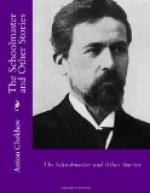“You have taken leave of your senses,” shouted Abogin. “It is ungenerous. I am intensely unhappy myself and . . . and . . .”
“Unhappy!” said the doctor, with a smile of contempt. “Don’t utter that word, it does not concern you. The spendthrift who cannot raise a loan calls himself unhappy, too. The capon, sluggish from over-feeding, is unhappy, too. Worthless people!”
“Sir, you forget yourself,” shrieked Abogin. “For saying things like that . . . people are thrashed! Do you understand?”
Abogin hurriedly felt in his side pocket, pulled out a pocket-book, and extracting two notes flung them on the table.
“Here is the fee for your visit,” he said, his nostrils dilating. “You are paid.”
“How dare you offer me money?” shouted the doctor and he brushed the notes off the table on to the floor. “An insult cannot be paid for in money!”
Abogin and the doctor stood face to face, and in their wrath continued flinging undeserved insults at each other. I believe that never in their lives, even in delirium, had they uttered so much that was unjust, cruel, and absurd. The egoism of the unhappy was conspicuous in both. The unhappy are egoistic, spiteful, unjust, cruel, and less capable of understanding each other than fools. Unhappiness does not bring people together but draws them apart, and even where one would fancy people should be united by the similarity of their sorrow, far more injustice and cruelty is generated than in comparatively placid surroundings.
“Kindly let me go home!” shouted the doctor, breathing hard.
Abogin rang the bell sharply. When no one came to answer the bell he rang again and angrily flung the bell on the floor; it fell on the carpet with a muffled sound, and uttered a plaintive note as though at the point of death. A footman came in.
“Where have you been hiding yourself, the devil take you?” His master flew at him, clenching his fists. “Where were you just now? Go and tell them to bring the victoria round for this gentleman, and order the closed carriage to be got ready for me. Stay,” he cried as the footman turned to go out. “I won’t have a single traitor in the house by to-morrow! Away with you all! I will engage fresh servants! Reptiles!”
Abogin and the doctor remained in silence waiting for the carriage. The first regained his expression of sleekness and his refined elegance. He paced up and down the room, tossed his head elegantly, and was evidently meditating on something. His anger had not cooled, but he tried to appear not to notice his enemy. . . . The doctor stood, leaning with one hand on the edge of the table, and looked at Abogin with that profound and somewhat cynical, ugly contempt only to be found in the eyes of sorrow and indigence when they are confronted with well-nourished comfort and elegance.
When a little later the doctor got into the victoria and drove off there was still a look of contempt in his eyes. It was dark, much darker than it had been an hour before. The red half-moon had sunk behind the hill and the clouds that had been guarding it lay in dark patches near the stars. The carriage with red lamps rattled along the road and soon overtook the doctor. It was Abogin driving off to protest, to do absurd things. . . .




